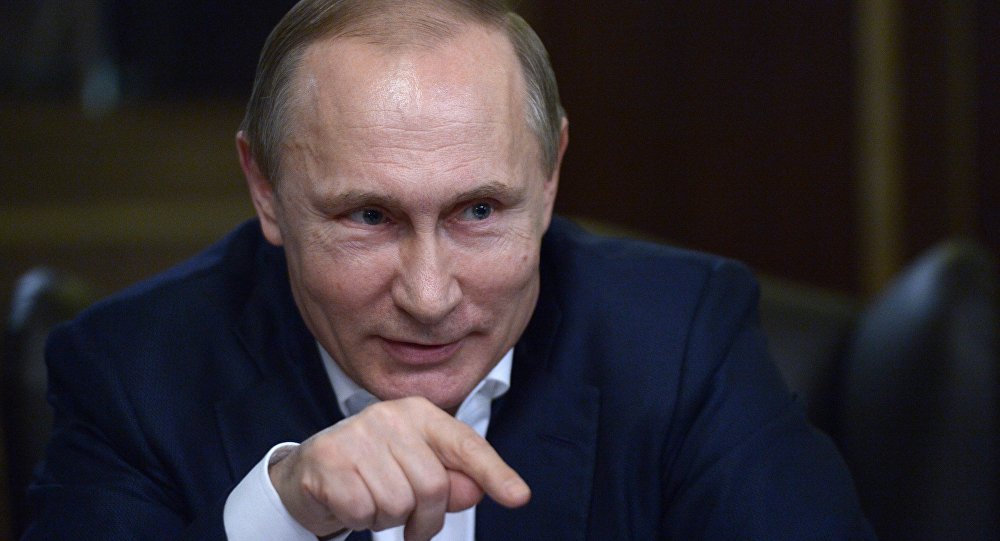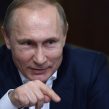
Putin Calls on Germany to Mend Fences by Recognizing Russian ‘National’ Interests
Publication: Eurasia Daily Monitor Volume: 13 Issue: 9
By:

It has become a cliché to write off President Vladimir Putin’s anti-Western pitches as only intended for internal consumption—uttered to rally the population around the Kremlin and dampen possible social discontent in times of economic and financial strain. However, in a recent interview for the German weekly Bild, clearly aimed at a Western audience, Putin once more accused the West of treachery for enlarging the North Atlantic Treaty Organization (NATO). Moreover, he again declared the annexation of Crimea to be absolutely legitimate (Kremlin.ru, January 11).
The interview was given last week in Sochi and published this week by Bild in German and English and by the Kremlin in Russian. During the interview, Putin spoke Russian, then switched to German and back again. Due to apparent redacting, there are discrepancies between the different versions of the text. For example, Putin asserted that relations between Russians and Germans were still good, despite the German mass media spreading anti-Russian propaganda under orders from Washington. The German journalists were dismayed: “Do you mean Bild? This is news to us.” Whereas, in the official Russian-language version of the interview, the German dismay was utterly redacted: Putin insists that Germany (like other Europeans) are proxies of the United States that have surrendered their independence, while the Bild journalists are silent, apparently accepting this purportedly obvious, though unpleasant fact (Kremlin.ru, Bild, January 11).
Putin seems to believe his own rhetoric and also apparently hopes that the European nations can be enlightened and induced to rebel against US domination. During the Bild interview, Putin produced a Russian-language memo, dated 1990, which detailed talks in Moscow between Soviet and German officials about the prospects of German unification. According to Putin, “wise man” Egon Bahr proposed that a new alliance must be formed, “separate of NATO,” that would include the Central European countries, the US and the Soviet Union. Bahr, a German Social Democratic Party (SPD) politician and the creator of the “Ostpolitik” policy in the 1970s, died last August, aged 93. But instead of pursuing the Bahr plan, Putin complained, NATO expanded in Europe, which was a grave mistake and a manifestation of Western post–Cold War triumphalism. “Leading NATO member-nations should have refused to accept new member states into the Alliance,” insisted Putin, “You are not obliged to accept applications” (Kremlin.ru, January 11).
The vision of a neutralized Europe, with the US and Russia as equal partners, with Moscow holding onto a recognized sphere of influence along with veto power on strategic decisions, and with NATO pared down or fully disbanded, could perhaps have been achieved if Moscow pressed harder. But the opportunity was lost, and Putin still laments that. According to Putin, Russia’s main mistake “in the last 25 years” was the failure “to state our national interests from the very beginning; if we did, maybe today the world would be more balanced” (Kremlin.ru, January 11).
Putin insists that today’s Russia does not want to “play the role of a superpower—it is too expensive.” Russia is, according to Putin, “the fifth or sixth world economy—today in trouble, but with good growth potential.” Still Putin angrily repudiated President Barack Obama’s statement that Russia is “a regional power”: Russia is too big and present in too many regions—Europe, Asia, the Arctic and the Pacific—a world power by definition (Kremlin.ru, January 12). Apparently, Putin is sending the West a message: Present-day Russian ambitions are lesser than those of the Soviet Union during the Cold War, and a possible future “Yalta 2.0”—an agreement to divide spheres of influence and settle scores to “balance” the world and make it a safer place—would not cost that much. The entire West or possibly several leading European countries, including Germany, must take the offer and strike a deal, even while Moscow is somewhat humbled by an economic downturn (Vedomisti, January 12).
Of course, there are conditions: The West must accept the Crimean annexation as just and absolutely legal. Ukraine must be accepted as a Russian de facto protectorate. The government in Kyiv must be pressured to accept constitutional reform, transforming that country into a loose federation, and discouraged to seek any form of integration with the European Union. All sanctions imposed over Crimea as well as the fighting in the Donbas region of eastern Ukraine must be scrapped. The US and its allies must accept Bashar al-Assad as the legitimate president of Syria. Putin stringently denies al-Assad’s culpability in massacres: “He is defending his nation from outside aggression by armed terrorists. Any civilian casualties are collateral and are the ultimate fault of the armed opposition and those who support them.” According to Putin, al-Assad did make some mistakes; a new constitution must be written and implemented in Syria, followed by new presidential and parliamentary elections. There is no need for Russia to consider providing al-Assad with asylum, since he will surely be reelected. The Russian military in Syria is bombing terrorists while supporting al-Assad and other forces that are fighting terrorist groups. Reports of “our pilots” killing civilians in Syria or attacking anyone who is not a terrorist are “all lies” (Kremlin.ru, January 12).
After a very heavy Russian bombardment (reportedly some 120 bombing sorties in two days) on January 12, pro-al-Assad forces took the strategically important town of Salma in the mountainous Jabal al-Akrad region of northern Latakia, which was held by the Syrian opposition for some three years. According to Russian reporters on the scene, the Russian-supported offensive will be pressed on to the Turkish border, where refugee camps are concentrated (Komsomolskaya Pravda, January 13). The Russian defense ministry insists that arms and fighters are crossing the border from Turkey into northern Latakia (Mil.ru, January 11). It is now reported that the Russian military deployment in Syria may last several years, apparently until al-Assad wins the civil war with Russian, Iranian and Hezbollah help (Komsomolskaya Pravda, January 14).
Last November 24, a Turkish fighter shot down a Russian Su-24 jet that was “bombing terrorists”—an act by Turkey that Putin describes as a “war crime.” Putin has warned the North Atlantic Alliance not to involve itself in the matter: “NATO must defend its members against attack, but no one is attacking Turkey. NATO nations, including Germany, must not help Turkey defend its interests inside Syria.” Putin expressed hope that future possible incidents “will not lead to a large-scale confrontation.” But if challenged, “Russia will defend its interests using all available means” (Kremlin.ru, January 12). This could mean not only conventional weapons.




